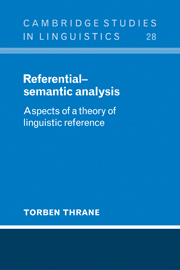Book contents
- Frontmatter
- Contents
- Preface
- Introduction: The functions of language
- PART I THE PRELIMINARIES
- PART II THE THEORY
- 3 SOME FUNDAMENTAL NOTIONS
- 4 THE BASIS OF RS-ANALYSIS
- 5 REFERENTIAL–SEMANTIC FEATURES
- 6 SUBJUNCTION AND ADJUNCTION
- PART III THE APPLICATION
- CONCLUSION: SUMMARY AND FURTHER PROSPECTS
- Bibliography
- Index
3 - SOME FUNDAMENTAL NOTIONS
Published online by Cambridge University Press: 06 August 2010
- Frontmatter
- Contents
- Preface
- Introduction: The functions of language
- PART I THE PRELIMINARIES
- PART II THE THEORY
- 3 SOME FUNDAMENTAL NOTIONS
- 4 THE BASIS OF RS-ANALYSIS
- 5 REFERENTIAL–SEMANTIC FEATURES
- 6 SUBJUNCTION AND ADJUNCTION
- PART III THE APPLICATION
- CONCLUSION: SUMMARY AND FURTHER PROSPECTS
- Bibliography
- Index
Summary
Referential function and referential potential
A number of points have been raised in a cursory fashion during the first two chapters which we need to take up in more detail. Prominent among these are the notions of the referential function of language and the distinction between different forms of semantic analysis.
It is universally accepted these days, I think, that there is no causal relationship between words and things. That which we call a rose by any other name would smell as sweet. Although this point may be held to be trivial now, one of the implications of it merits some attention. Since it is an important point, and since it has not been generally appreciated, if at all, I shall state it as concisely and as forcefully as I can:
(1) There is no logical requirement on language, conceived of as a rule-governed system of signs, that it should correlate with things, events, states of affairs, etc. at all. Differently formulated: It does not necessarily follow from the fact that we can speak that we should be able also to speak about something.
The uninterpreted, formal languages of logicians give substance to (1). Since natural languages differ from formal languages at least in respect of being ‘interpreted’ we may say, in spite of (1), that there are correlations between signs and things, but that these correlations must be contingent rather than necessary.
- Type
- Chapter
- Information
- Referential-Semantic AnalysisAspects of a Theory of Linguistic Reference, pp. 33 - 38Publisher: Cambridge University PressPrint publication year: 1980



